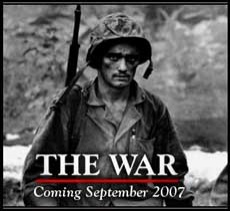 Activists who believe Latinos deserve more recognition for their contributions during World War II have created an agonizing political problem for PBS and filmmaking star Ken Burns.
Activists who believe Latinos deserve more recognition for their contributions during World War II have created an agonizing political problem for PBS and filmmaking star Ken Burns.
by David Bauder
NEW YORK – Several Latino leaders and military veterans, angry that Burns' high-profile documentary series "The War" includes no conversations with Latinos who fought, are demanding changes. PBS and Burns want to satisfy an important constituency, without the precedent of a filmmaker forced to change his vision due to a protest.
PBS chief executive Paula Kerger, after meetings with leaders including Congress' Hispanic caucus, has promised suggested solutions as early as this week.
Burns' 14-hour documentary is scheduled to premiere in September. PBS hopes it becomes as definitive a record of the World War II experience as Burns' "The Civil War" was for that conflict, and as popular. Kerger has already described it as Burns' greatest work…
Even though the film hasn't been seen publicly, its lack of Latino representation was sniffed out by Maggie Rivas-Rodriguez, a former newspaper reporter who runs an oral history project about Latino World War II veterans at the University of Texas.
Rivas-Rodriguez and her staff police projects about World War II all over the country – books, films, conferences and the like – to make sure Latinos are represented. Last November, when Burns previewed his film at a museum, her project manager asked whether Latino veterans were interviewed in the documentary. She was told no, and immediately set about trying to raise awareness.
Anger over "The War" has deep roots.
Rivas-Rodriguez has stories from Latino Medal of Honor winners who came home to Texas only to be denied service at restaurants. She thinks few Americans are aware of the experiences, and the lack of attention it received in Tom Brokaw's best-selling book "The Greatest Generation" didn't help.
"It's a real sore spot to say to someone that your experience wasn't unique in this country," she said. "Our people weren't valued. Not only were they not valued then, they are not being valued today."
The large Latino presence among the armed forces fighting the Iraq War deepens the sensitivity toward this issue, said Marta Garcia, head of the New York chapter of the National Hispanic Media Coalition.
Burns' film focuses on the wartime experiences of people from four communities across the country – Waterbury, Conn.; Mobile, Ala.; Sacramento, Calif.; and Luverne, Minn. He weaves their individual stories about combat together to tell how the war changed lives, and changed the world.
Since he's spent his career trying to tell overlooked stories in American history, Burns said he can appreciate the Latino community's concerns.
"We did not set out to exclude Latinos, or any other group for that matter," he told The Associated Press. "In fact, thousands of stories have not been included. We set out to explore the human experience of war and combat based on a handful of stories told by individuals in only four American towns."
Still, it hasn't escaped the Latino groups' notice that blacks are talked to in the film about segregated forces, and Japanese-Americans about their internment.
Burns' stature makes the issue so crucial. "A lot of people regard Ken Burns as the country's documentarian," Rivas-Rodriguez said.
She would like to see the project expanded to include the Latino experience, perhaps even by a couple of hours. A separate film has little appeal, because few beyond those directly involved would care, she said.
"It has to be something substantive," she said. "It can't be simply inserting someone with a (Latin) last name and saying, `Oh, yeah, he was there, too.'"
To Burns, the film is done. He's already traveling to promote it, and showed a segment to cadets at West Point two weeks ago. PBS wanted to finish early to allow for ancillary products, including a book. PBS affiliates are making films about local wartime experiences.
Even if they were to entertain the idea, Burns' representatives argue that substantial changes would be difficult. To fit the narrative, Burns would have to find Latino veterans from one of the four communities, and seek out footage from the specific battles they talk about. The time-consuming process is why it took six years to make the film.
Imagine PBS' predicament. Its executives are loath to impose upon someone's creative vision, particularly the system's biggest star. If PBS changes a film because of one group's complaint, what happens the next time?
Yet PBS, of course, gets a big chunk of its funding from the federal government. The Hispanic caucus is much more important than it was five months ago, when the election put Congress under Democratic control. The National Hispanic Media Coalition is also well known to PBS for its challenges to TV station license renewals, and has criticized PBS for not hiring enough Latinos.
"PBS takes this situation very seriously," said PBS spokeswoman Lea Sloan. "The stories of all the diverse communities in this country, including the Latinos, are of critical importance and while PBS has been a leading forum for these voices to be heard, there is more that needs to be done."
Michael Getler, PBS' ombudsman, has looked into the issue. He wondered whether anyone had even thought about Latino veterans during the film's six-year gestation. If nothing else, it shows how new thinking is always necessary in a diverse country, he said.
He did not, however, offer ideas to satisfy the protesters.
ATTENTION READERS
We See The World From All Sides and Want YOU To Be Fully InformedIn fact, intentional disinformation is a disgraceful scourge in media today. So to assuage any possible errant incorrect information posted herein, we strongly encourage you to seek corroboration from other non-VT sources before forming an educated opinion.
About VT - Policies & Disclosures - Comment Policy




